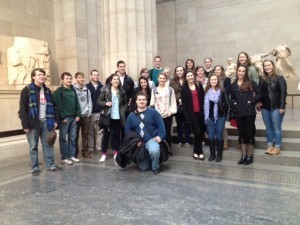Archaeology and Ethics Field Trip to The British Museum

Prof. Fay Stevens, who leads the course, writes:
“The Archaeology and Ethics course covers the topics of archaeological ethics; the relationship between archaeology and others (the public, ethnic groups, avocational archaeologists, collectors, etc.); international and national approaches to archaeological heritage management (such as the effects of conflict on heritage); the antiquities market; reburial and repatriation of cultural heritage; issues of identity; the ethics of collecting; plunder; underwater archaeology, and treasure hunting; archaeology as a profession; and archaeological education. We explore these themes in a variety of contexts, including fieldtrips to Bath and Stonehenge, The British Museum (e.g. the Parthenon Marbles, Egyptian Mummies, the Rosetta Stone), The Petrie Museum, The Ashmolean and Pitt Rivers Museums in Oxford etc.